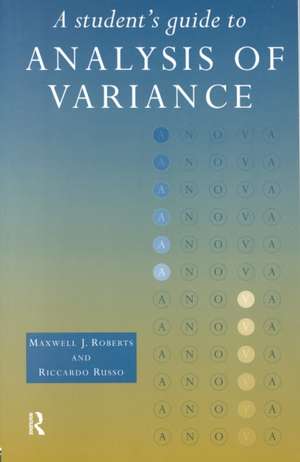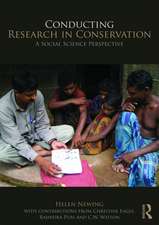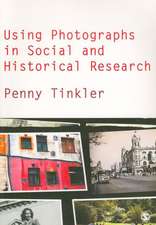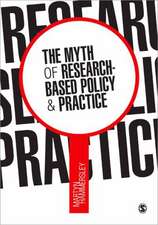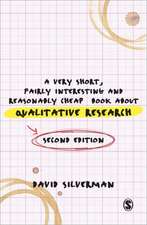A Student's Guide to Analysis of Variance
Autor Maxwell Roberts, Riccardo Russoen Limba Engleză Paperback – 14 ian 1999
A Student's Guide to Analysis of Variance covers a range of statistical techniques associated with ANOVA, including single and multiple factor designs, various follow-up procedures such as post-hoc tests, and how to make sense of interactions. Suggestions on the best use of techniques and advice on how to avoid the pitfalls are included, along with guidelines on the writing of formal reports.
Introductory level topics such as standard deviation, standard error and t-tests are revised, making this book an invaluable aid to all students for whom ANOVA is a compulsory topic. It will also serve as a useful refresher for the more advanced student and practising researcher.
Preț: 445.89 lei
Nou
Puncte Express: 669
Preț estimativ în valută:
85.32€ • 89.49$ • 71.03£
85.32€ • 89.49$ • 71.03£
Carte tipărită la comandă
Livrare economică 02-16 aprilie
Preluare comenzi: 021 569.72.76
Specificații
ISBN-13: 9780415165655
ISBN-10: 0415165652
Pagini: 288
Ilustrații: 53 black & white tables
Dimensiuni: 138 x 216 x 21 mm
Greutate: 0.37 kg
Ediția:1
Editura: Taylor & Francis
Colecția Routledge
Locul publicării:Oxford, United Kingdom
ISBN-10: 0415165652
Pagini: 288
Ilustrații: 53 black & white tables
Dimensiuni: 138 x 216 x 21 mm
Greutate: 0.37 kg
Ediția:1
Editura: Taylor & Francis
Colecția Routledge
Locul publicării:Oxford, United Kingdom
Public țintă
Postgraduate and UndergraduateCuprins
List of Figures. List of Tables. List of Boxes. Preface. Acknowledgements. Introduction. Averages, Measures of Dispersal and the t-test. Using Variance to Test Hypotheses. Calculating F Ratios for One-factor Between-subjects Designs. One-factor Between-subjects ANOVA: Advanced Topics. Following up a One-factor Between-subjects ANOVA. Calculating F Ratios for One-factor Within-subjects Designs. An Introduction to Factorial Designs and Interactions. Calculating F Ratios for Two-factor Between-subjects Designs. Following up a Two-factor Between-subjects ANOVA. Interpreting Two-factor Mixed and Within-subjects Designs. Interpreting a Three-factor ANOVA. Summary and Frequently Asked Questions. Appendix A: Writing up the Results of Analysis of Variance. Appendix B: Statistical Tables. Notes. References. Index.
Recenzii
The first 40 pages of this text explain the basics of experimental procedure, samples and populations, hypothesis testing, the mean, variance, t-tests and how variance can be used to look for group differences. The material is handled extremely well and the reader certainly gets a good flavour of this important background information. The chapter on interactions and how to interpret them is one of the best I have seen: it gently guides the reader to a richer understanding of why interactions are so important. A great book for most second-year undergraduate students. - Andy Field, Royal Holloway University of London
This is an attractive and clearly-written book with a certain amount of soul or conviction, even though it is a statistics textbook. - John Goyder, University of Waterloo
This book has proven to be essential in my understanding of ANOVA. Every aspect of analysis of variance is clearly explained and the text is very easy to read and understand. Every new aspect is backed up with worked examples, making it easy to grasp both the simpler and more complex concepts. Particularly useful is the appendix explaining how to present the results of ANOVA's in a formal lab report. This text goes further than standard statistics textbooks and I would recommend it to anyone who has to use ANOVA, whether for the first time or for refreshing your memory! - Psychology undergraduate on Amazon.co.uk
This is an attractive and clearly-written book with a certain amount of soul or conviction, even though it is a statistics textbook. - John Goyder, University of Waterloo
This book has proven to be essential in my understanding of ANOVA. Every aspect of analysis of variance is clearly explained and the text is very easy to read and understand. Every new aspect is backed up with worked examples, making it easy to grasp both the simpler and more complex concepts. Particularly useful is the appendix explaining how to present the results of ANOVA's in a formal lab report. This text goes further than standard statistics textbooks and I would recommend it to anyone who has to use ANOVA, whether for the first time or for refreshing your memory! - Psychology undergraduate on Amazon.co.uk
Notă biografică
Maxwell Roberts, Riccardo Russo
Descriere
Roberts and Russo cover a range of techniques associated with ANOVA, including single and multiple factor designs, post hoc tests and how to make sense of interactions, and provide guidelines for writing reports.
